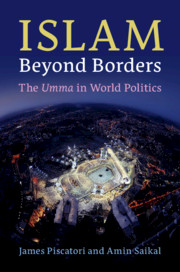
-
Select format
-
- Publisher:
- Cambridge University Press
- Publication date:
- September 2019
- September 2019
- ISBN:
- 9781108666589
- 9781108481250
- 9781108740555
- Dimensions:
- (228 x 152 mm)
- Weight & Pages:
- 0.45kg, 224 Pages
- Dimensions:
- (228 x 152 mm)
- Weight & Pages:
- 0.34kg, 224 Pages
You may already have access via personal or institutional login
Book description
Assuming a central place in Muslim life, the Qur'an speaks of one community of the faith, the umma. This unity of the faithful is recognised as the default aspiration of the believer, and in the modern era, intellectuals and political leaders have often vied both to define, and to lead it. Based on case studies of actors such as Saudi Arabia, Iran, and ISIS, James Piscatori and Amin Saikal consider how some appeals to pan-Islam prove useful, yet other attempts at cross-border institutionalisation including the Sunni Caliphate or the modern Shi'i-inspired Islamic Revolution, founder on political self-interest and sectarian affiliations. Accompanied by a range of scriptural references to examine different interpretations of the umma, Piscatori and Saikal explore why, despite it meaning such widely different things, and its failure to be realised as a concrete project, neither the umma's popular symbolic appeal nor its influence on a politics of identity has diminished.
Reviews
'… this is a very timely, informative, and insightful book.'
A. T. Kuru Source: Choice
‘Piscatori and Saikal fill a lacuna among existing publications in their book’s blending of political theory with a novel analysis of political practices among contemporary Muslims … This book should be the default text for fellow practitioners and anyone who wishes to understand the rapidly changing pace of events in Islam and politics today.’
Ravza Altuntaş-Çakır Source: Insight Turkey
Contents
Metrics
Altmetric attention score
Full text views
Full text views help Loading metrics...
Loading metrics...
* Views captured on Cambridge Core between #date#. This data will be updated every 24 hours.
Usage data cannot currently be displayed.
Accessibility standard: Unknown
Why this information is here
This section outlines the accessibility features of this content - including support for screen readers, full keyboard navigation and high-contrast display options. This may not be relevant for you.
Accessibility Information
Accessibility compliance for the PDF of this book is currently unknown and may be updated in the future.


